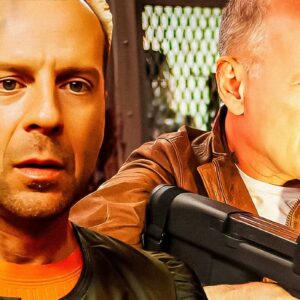Bruce Willis is a name that resonates deeply with Hollywood and moviegoers across the globe. For over three decades, Willis has been a mainstay in cinema, defining and redefining the role of the modern action hero while seamlessly transitioning between genres. His rugged charm, deadpan humor, and impressive versatility as an actor have made him one of the most beloved and influential figures in the entertainment industry. Whether playing a hardened cop, a boxer seeking redemption, or a man grappling with the supernatural, Willis has proven time and again that he can inhabit any character with depth and charisma. This article takes a look back at some of his most impactful films and examines the profound mark he has left on Hollywood.
Early Career and Breakthrough
Born in 1955 in West Germany and raised in New Jersey, Bruce Willis had a somewhat modest start in the entertainment world. His early career saw him taking on smaller roles in theater and television, but it wasn’t until his breakout role in the hit TV series Moonlighting (1985-1989) that Willis began to make a name for himself. Starring alongside Cybill Shepherd, Moonlighting showcased Willis’s comedic chops as David Addison, a private detective with a quick wit and a sharp tongue. The show, a perfect blend of romance, comedy, and detective mystery, became a massive success, propelling Willis into the spotlight.
Despite his success on television, Willis had his sights set on the big screen. His transition to film was gradual, but when he landed the role of John McClane in Die Hard (1988), everything changed. At the time, Willis was far from a household name in the world of action films. In fact, many doubted whether he could carry the role of a tough, lone-wolf cop in a genre dominated by the likes of Arnold Schwarzenegger and Sylvester Stallone. But Die Hard wasn’t just any action movie—it redefined the genre, and with it, turned Bruce Willis into a bona fide movie star.
Die Hard: Redefining the Action Hero
When Die Hard hit theaters in 1988, no one could have predicted the impact it would have on both the action genre and Willis’s career. The film, directed by John McTiernan, told the story of NYPD officer John McClane, who finds himself up against a group of terrorists during a Christmas party in a Los Angeles skyscraper. With nothing but his wits and sheer determination, McClane takes on the bad guys, resulting in one of the most iconic and thrilling action movies of all time.
What set Die Hard apart from other action films of the era was its focus on an everyman hero. McClane wasn’t a muscle-bound super-soldier; he was vulnerable, flawed, and deeply human. Willis played the role with a perfect balance of grit and humor, delivering memorable one-liners like “Yippee-ki-yay, motherf*****” that have since become legendary. His portrayal of McClane revolutionized the action hero archetype, moving away from invincible warriors to more relatable, everyday figures who could get hurt but would never give up.
The success of Die Hard spawned four sequels, with Willis reprising his role as McClane in each one. Though the sequels varied in critical reception, Willis’s portrayal of the wise-cracking, resilient cop remained a constant, cementing his place as one of the most beloved action stars in Hollywood history.
Pulp Fiction: A Career Rebirth
By the mid-1990s, Bruce Willis had firmly established himself as an action star, but like many actors in Hollywood, he sought to avoid being typecast. Enter Quentin Tarantino’s Pulp Fiction (1994), the film that allowed Willis to reinvent himself and showcase a different side of his talent. Playing Butch Coolidge, a washed-up boxer who double-crosses a mob boss, Willis delivered a performance that was raw, intense, and deeply layered.
Pulp Fiction was a defining moment for Willis. Not only did it introduce him to a new generation of filmgoers, but it also proved that he could excel in character-driven roles outside of the traditional action mold. His scenes with Ving Rhames, particularly the tense moments in the pawn shop, remain some of the most memorable in the film. Tarantino’s unconventional storytelling and sharp dialogue gave Willis the chance to push his boundaries, demonstrating his ability to convey complex emotions and vulnerability.
The Sixth Sense: Emotional Range
If Die Hard showcased Willis as an action hero and Pulp Fiction highlighted his versatility, The Sixth Sense (1999) revealed his depth as a dramatic actor. Directed by M. Night Shyamalan, this supernatural thriller became a cultural phenomenon, and Willis’s performance as child psychologist Dr. Malcolm Crowe was a key reason for its success.
In The Sixth Sense, Willis played against type, trading in the bravado of his action roles for a quieter, more introspective character. His chemistry with young actor Haley Joel Osment, who played the boy haunted by visions of the dead, was nothing short of extraordinary. Willis delivered a nuanced and emotionally restrained performance, conveying a deep sense of sorrow and regret as his character grapples with personal loss and guilt. The film’s shocking twist ending became a hallmark of the genre, and The Sixth Sense earned Willis critical acclaim, proving once again that he was much more than just an action star.
Blockbusters and Science Fiction: Armageddon and Looper
As the 1990s came to a close, Bruce Willis continued to dominate the box office with a string of successful films. One of the biggest was Armageddon (1998), directed by Michael Bay. In this high-octane disaster movie, Willis played Harry Stamper, a gruff oil driller tasked with saving the world from an impending asteroid collision. While the film was criticized by some for its over-the-top spectacle, there was no denying its massive appeal. Armageddon was a global box office hit and solidified Willis’s status as one of Hollywood’s top leading men.
Fast forward to 2012, and Willis once again found himself at the center of a critically acclaimed film, Looper. Directed by Rian Johnson, Looper was a smart, inventive science fiction film that paired Willis with rising star Joseph Gordon-Levitt. The film explored complex themes of time travel, destiny, and moral ambiguity, with Willis playing an older version of Gordon-Levitt’s character. Looper was praised for its sharp writing and bold storytelling, and Willis’s performance reminded audiences that he could still hold his own in thought-provoking, genre-defying roles.
Contributions to Cinema
Bruce Willis has undeniably shaped the modern action hero archetype. His portrayal of John McClane in Die Hard broke the mold, shifting the action genre towards more relatable, vulnerable heroes. The influence of McClane can be seen in countless action films that followed, from Lethal Weapon to Speed. Beyond his contribution to action films, Willis has also shown an unwavering commitment to diversity in his roles. He has taken on everything from dark comedies like The Whole Nine Yards (2000) to voice work in animated films like Over the Hedge (2006), proving time and again that he is a multifaceted actor.
Moreover, Willis has been instrumental in inspiring a generation of filmmakers and actors. His ability to blend action, drama, and humor has set a high standard, and his work with directors like Quentin Tarantino and Rian Johnson has left an indelible mark on the industry.
Later Career and Legacy
As Bruce Willis aged, his roles evolved to reflect his changing career. He began to take on more ensemble pieces and supporting roles, allowing younger actors to step into the spotlight. Films like Red (2010) and The Expendables series showcased Willis in more comedic and self-aware roles, often playing up his status as a veteran action star. In recent years, Willis has also delved into voice acting and smaller, more intimate projects.
In 2022, Willis made the difficult decision to retire from acting due to health concerns, specifically a diagnosis of aphasia. His retirement marked the end of an era, but his impact on Hollywood remains undeniable. Fans and colleagues alike have praised his body of work and his contributions to the industry.
Conclusion
Bruce Willis is more than just an action star—he is a cinematic icon whose performances have left an enduring legacy. From his breakout role in Die Hard to his emotional turn in The Sixth Sense, Willis has continually pushed the boundaries of what it means to be a Hollywood leading man. His willingness to take on diverse roles, his influence on the action genre, and his ability to resonate with audiences across generations make him one of the most significant actors of his time. Though his career has come to a close, Bruce Willis’s indelible mark on Hollywood will continue to inspire and entertain for years to come.





